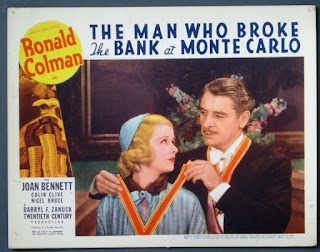Most of the action in the 71 minute film is at the very beginning and the end. In between, there is the feeling that the screenwriters were killing time until we could get to those final scenes. It's not that the film was dull - it really wasn't. But it was hard to know exactly where the movie wanted to go and what tone it wanted to strike.
While this is not one of Ronald Colman's best roles, he is delightful as Paul (this was released the same year as Clive of India and A Tale of Two Cities - two powerhouse parts for him). He also has a very good rapport with Joan Bennett (Helen Berkeley) in their second film together - they had previously appeared together in Bulldog Drummond (1929). As in that film, it is clear that Mr. Colman is the star; unfortunately for Ms. Bennett, the part of Helen is not really well defined. As Ms. Bennett and Mr. Colman didn't work together after this, one wonders what would have happened had Ms. Bennett been given better written roles and a character able to go toe-to-toe with Mr. Colman.
Joan Bennett was born into an acting family. Her maternal grandparents were actors, as were her mother and father (her mother would eventually become a literary agent). Her sisters also were actors: Barbara and Constance Bennett. Joan appeared in two films (in 1916 and 1923), then was on Broadway (to which she would return in 1950, in Love Me Little) in Jarnegan (1928). After two uncredited film roles, she appeared as the ingenue in Bulldog Drummond. With her blonde hair (her natural color) and youthful face, she was perfect for roles like Amy in Little Women (1933). Her career path would change, however, when future husband Walter Wanger and director Tay Garnett convinced her to go brunette for the film Trade Winds (1938). After that, she was a natural for roles like Kitty in Scarlet Street (1945). Married four times, her career all but ended when her third husband, Walter Wanger, shot Joan's agent in a fit of jealousy. She'd continue her career with regional stage performances (including the national tour of Bell, Book and Candle as Gillian). (In contrast, Wanger's career was not affected after he served his four-month jail sentence.) Television would prove a reentry for Ms. Bennett - she won an Emmy nomination for her role as Elizabeth Collins Stoddard in Dark Shadows (1966-1971). In 1970, she published her autobiography The Bennett Playbill (written with Lois Kibbee), and continued to appear in TV movies. She died of a heart attack in 1990, at the age of 80. For more on Joan and sister Constance, see this article from the Bill Douglas Cinema Museum at the University of Exeter.
Two excellent, but sadly brief performances are turned in by Colin Clive (as Helen's nefarious brother Bertrand) and by Nigel Bruce (as Paul's valet, Ivan). Mr. Clive is deliciously nasty; it's a shame he has so few scenes. And Mr. Bruce gets most of the really good lines. He's really funny, and not at all the buffoon that he would play in his later career.
Sylvia Sidney was originally considered for the role of Helen, and John Ford was to direct - an accident on his boat gave the director's chair to Stephen Roberts (AFI catalog). The film's title is taken from an 1890's music hall song, resulting in the studio being sued by the heirs of songwriter Fred Gilbert, for violation of their copyright; they eventually lost the suit. You can hear the song sung by music hall comedian Charles Coborn in the video below - you'll notice the song has nothing at all to do with the plot of the movie. The song would actually be sung in several films, including The Magnificent Ambersons (1942), Lawrence of Arabia (1962) and Alien: Covenant (2017). (TCM article).
The New York Times reviewer was not impressed with the film; they somewhat liked Ronald Colman, but were quite hard on Joan Bennett (really, she doesn't have a strong script. We thought they were being unfair). It wasn't until May, 1946 that a radio version aired on Hollywood Star Time, with Rex Harrison and Lurlene Tuttle as the leads. Perhaps the film is justifiably forgotten today, but it's worth seeing for Colman alone. He's always a treat.
As promised, we'll leave you with the song on which the title was based.





No comments:
Post a Comment
Thanks for your interest in this blog. Your comments will be moderated to minimize spam to the website. Thanks for understanding.